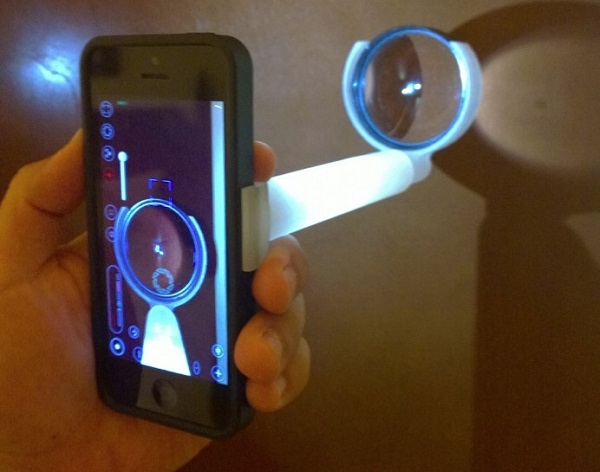
Even though it’s not the best idea in the world to diagnose yourself or have someone from the family do it at home, the EyeGo adapters for smartphones might trigger the alarm that would push people to go see an ophthalmologist.
An ophthalmologist’s office includes all sorts of devices that can be used to examine someone’s eyes in great detail. This way, not only the diopters can be determined, but also the thickness of the cornea, for example, among many-many other things. In rural areas and developing countries, such complex examinations usually cannot be performed either because there isn’t any trained personnel to do them, or the necessary equipment cannot be bought. In such cases, the EyeGo adapters for smartphones could be used for performing eye exams in an easy, quick manner.
Assistant professor of ophthalmology Dr. Robert Chang and ophthalmology resident Dr. David Myung developed two EyeGo adapters that attach easily to any smartphone with a decent camera. Why two adapters? It’s quite simple, actually. One of them is used for analyzing the cornea (the front surface of the eye), while the other one focuses the light on the retina (the back of the eye). While not exactly professional equipment, the EyeGo system does a great job in preliminary identifying any eye problems that people might have.
As the two developers said, the EyeGo adapters are meant to “make it easy for anyone with minimal training to take a picture of the eye and share it securely with other health practitioners or store it in the patient’s electronic record.” It’s quite obvious that these smartphone adapters will put ophthalmology under a new light, so I only hope that the two researchers continue their work.
When I was 4-years old, my grandparents discovered that the center of my eyes looked clouded, after noticing that I was standing really close to the TV to see whatever was on. There hadn’t been any cataracts cases, or any severe eye diseases prior to my case in the family, so there was nothing suggesting that they should check my eyes periodically. From this point of view, I regret being born in a time when medical technology wasn’t as widely spread as it is today. While my problem couldn’t have been avoided, as it had a genetic characteristic, it could’ve been discovered earlier, probably making things a bit better for me.
Be social! Follow Walyou on Facebook and Twitter, and read more related stories about the smart glasses that enable nurses to see through your skin, and the castAR glasses that could pose a threat for Oculus Rift.